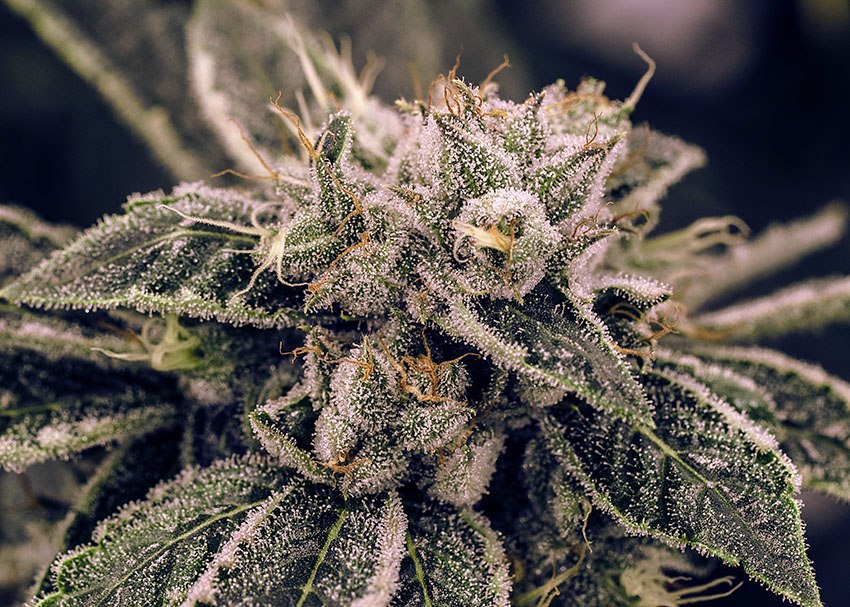
That crystalline shimmer, sticky texture, and indulgent fragrance of your favorite cannabis strains are all products of terpenes. These organic compounds are found in all plant life and result in a wide range of unique aromas and flavors. From sweet fruits, fresh florals, and earthy spices, terpenes can do it all.
There are over 200 terpene varieties found in the cannabis plant. Individual cannabis strains that have their own distinctive flavors and scents are a result of their unique terpene profiles. Many scientific studies into cannabis terpenes have concluded that these essential oils go far beyond simply determining the plant’s flavor palette. Much like THC and CBD (cannabinoids) have different influences on your body and mind, various terpene compounds can provide diverse effects and benefits to medical cannabis users.
The Abide cannabis sommeliers have expert knowledge on a large variety of terpene profiles. Every day we proudly provide our patients with insight on how to best utilize specific terpene and cannabinoid combinations to help manage various conditions. In this guide, we will look at the six most common cannabis terpenes, their defining characteristics, and the therapeutic benefits they can provide cannabis-based medicine users.
Myrcene is the most common terpene found in modern commercial cannabis products. While individual strains can produce many different types of terpenes, myrcene is found in over 20% of cannabis terpene profiles on average. Because myrcene is so abundant in medical cannabis it is known in the industry as the “Mother of all Terpenes”.
The myrcene compound produces an earthy, herbal aroma, with subtle hints of various spices.
Many plants produce differing amounts of the myrcene terpene including bay leaves, lemongrass, and the thyme plant.
For centuries, organic plants containing high amounts of myrcene terpenes have been used as a sleep aid in many traditional medicine practices. Research into other potential benefits of myrcene and THC include:
Limonene is one of the most aromatic terpenes, making its trademark citrusy scent an easy identifier. But because the aroma of limonene is so strong, many cannabis strains that smell citrusy may actually have other more dominant terpenes that are harder to detect by smell alone.
Limonene terpenes give off a signature aroma of citrus with undertones of various other fruits. The limonene compound can even produce hints of mint and other sharp flavored spices.
Citrus fruit rinds like lemons, oranges, and grapefruits, contain high amounts of limonene terpenes. It can also be found in the terpene profiles of juniper, peppermint, and rosemary.
Plants that produce limonene terpenes typically rely on the aromatic oil as a natural insecticide to repel pests and predators. Studies focussing on the combination of limonene and cannabinoids describe other potential benefits as:
The Pinene molecule is one of the most widely researched and documented terpenes found in the cannabis flower. It is available in two varieties referred to as Alpha-pinene (α-pinene) and Beta-pinene (β-pinene). The alpha variety is more common in the terpene profiles of cannabis strains, while the beta-pinene is present in smaller amounts, and more likely to be found in other plant life.
As the name would suggest, the pinene terpenes have a very pine tree-like fragrance, similar to Christmas trees. The aroma is also commonly described as earthy, yet very refreshing – much like a Northern California forest.
Pinene is the most common occurring terpene in all other natural plant life on Earth. This compound is found in almost every Evergreen tree, basil, orange peels, parsley, and hundreds more.
Pinene is often used as an effective ingredient in topical antiseptic ointments. Research suggests that the pinene terpene is also beneficial for patients struggling with inflammatory diseases such as fibromyalgia or arthritis. Other potential therapeutic benefits of cannabis contain high amounts of the pinene compound include:
Hundreds of plants naturally produce linalool due to the high number of benefits it can provide throughout their growth cycles. When this compound is mixed with cannabinoids like THC, it can offer many cannabis patients similar therapeutic effects.
Linalool is notorious for its lavender-like aroma, and other floral-like scents. It has hints of sweet citrus and subtle notes of spiciness as well.
The scent of the lavender flower is a primarily result of the linalool terpene. Other plants that naturally produce this essential oil include birchwood, coriander, and even most tomato varieties.
Linalool has a multitude of potential medicinal uses. Scientific studies on lab mice have even found a promising link between the therapeutic use of linalool and the management of Alzheimer’s disease. As research continues, other studies indicate the linalool terpene compound combined with cannabinoids may also aid in:
Humulene is another common terpene found in many cannabis profiles as well as other very well-known crops. The distinctive smell and bitter flavor of beer hops is a product of the humulene terpenoid.
The aroma of the humulene terpene is most often described as an earthy musk, with hints of herbally spices.
Hop plants produce large amounts of the humulene terpene, but it is also commonly found in a number of other plants including balsam fir wood, black pepper, and ginger root.
Ancient Chinese apothecaries utilized plants with high amounts of humulene as a natural antibiotic and energy stimulant. Today, ongoing research into the humulene terpene and cannabis use suggest multiple other benefits including:
The terpinolene terpene can easily be referred to as the “least-common common terpene” found in the cannabis flower. Many cannabis strains incorporate terpinolene in their terpene profiles, but it is typically in small amounts.
Terpinolene has a fresh floral aroma, with hints of allspice and citrus.
You can find terpinolene in the terpene profiles of lilacs flowers, apples, cumin, sage leaves, tea trees, and many other plants.
Terpinolene has been used in many medicinal practices to soothe your central nervous system and provide a calming effect. Research also indicates the terpinolene terpene and THC may offer other benefits such as:
At Abide, our goal is to help all our patients find relief through medical cannabis. Our cannabis sommeliers can provide personalized recommendations on specific strains containing various terpene and cannabinoid combinations to suit your individual needs.
Visit our new cannabis dispensary in downtown Napa to meet with our expert team, and allow us to guide you through our selection of high-quality medical cannabis. Or order your favorite strains online for curbside pick-up or same-day local delivery!

Open Daily: 9am - 8pm






ACKNOWLEDGMENT OF CALIFORNIA LAW. You expressly acknowledge that Abide services are for qualified patients under California Health & Safety Code Section 11362.5, 11362.7, et seq., and a physician has recommended the use of medical marijuana. You also expressly acknowledge that the use, possession, cultivation, transportation and distribution of cannabis is illegal in California unless all participants are acting completely within the scope of California’s medical cannabis laws as set forth in the Attorney General’s Guidelines for the Security and Non-Diversion of Marijuana Grown for Medical Use and the Medical Cannabis Regulation & Safety Act (consisting of AB243, AB266 and SB643) and any amendments thereto.